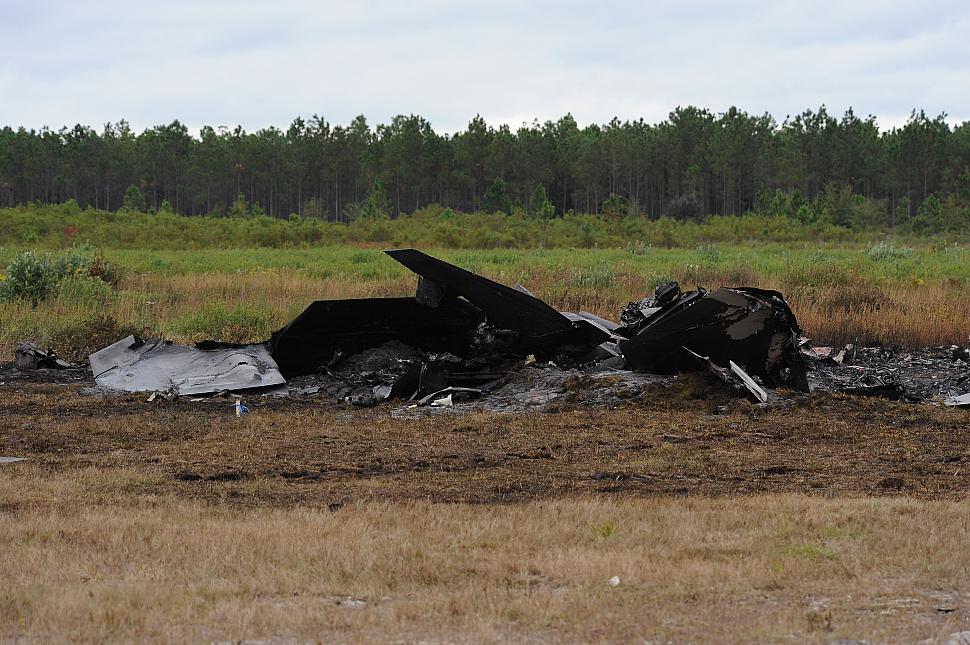Fighter Jet News
F-22 Raptor News
F-22 accident report released
August 9, 2013 (by
Air Combat Command ) -
A chafed electrical wire, which arced and led to an internal fire, caused an F-22A Raptor to crash at Tyndall Air Force Base on November 15, 2012, according to an Air Combat Command Accident Investigation Board report released today.

The aircraft belonged to 43rd Fighter Squadron, Tyndall AFB, and the pilot was the flight lead of a two-ship training mission. The pilot ejected safely, was recovered by Tyndall AFB emergency response members and sustained no significant injuries.
According to the results of the investigation, the cause of the mishap was a chaffed, positive generator-feeder wire that arced, burned through an adjacent hydraulic line, and caused the generator to go offline. When the pilot attempted to restart the generator, the ensuing arc ignited the misting hydraulic fluid and started a fire in the F-22's left accessory-drive bay. The fire compromised critical electrical and hydraulic systems that control the F-22 flight control surfaces, and led to an unrecoverable situation.
Additionally, based on the evidence, the board president found that the weather substantially contributed to the mishap. Specifically, a solid, undercast cloud layer did not allow for a visual-flight pattern, which affected the pilot's and radar controllers' recovery options.
The F-22 was destroyed, with total damage estimated at $149.6 million, including related equipment and impact site restoration.
Maintenance personnel have incorporated the investigation's findings into multiple recurring inspections of the entire F-22 fleet that ensure aircraft are operating at acceptable risk levels. Officials also are planning a permanent modification to the parts separating hydraulic and electrical lines to further minimize the chance of a recurrence of a similar event.
Attached is a photograph of the F-22 crash site from Thursday, November 15 on Tyndall AFB. 325th FW officials are continuing to investigate and secure the scene. The pilot safely ejected from the aircraft and first responders were on the scene in less than two minutes. [USAF photo by Lisa Norman]
According to the results of the investigation, the cause of the mishap was a chaffed, positive generator-feeder wire that arced, burned through an adjacent hydraulic line, and caused the generator to go offline. When the pilot attempted to restart the generator, the ensuing arc ignited the misting hydraulic fluid and started a fire in the F-22's left accessory-drive bay. The fire compromised critical electrical and hydraulic systems that control the F-22 flight control surfaces, and led to an unrecoverable situation.
Additionally, based on the evidence, the board president found that the weather substantially contributed to the mishap. Specifically, a solid, undercast cloud layer did not allow for a visual-flight pattern, which affected the pilot's and radar controllers' recovery options.
The F-22 was destroyed, with total damage estimated at $149.6 million, including related equipment and impact site restoration.
Maintenance personnel have incorporated the investigation's findings into multiple recurring inspections of the entire F-22 fleet that ensure aircraft are operating at acceptable risk levels. Officials also are planning a permanent modification to the parts separating hydraulic and electrical lines to further minimize the chance of a recurrence of a similar event.
Courtesy of Air Combat Command Public Affairs
Related articles:
Forum discussion:
Tags
- F-22 crashes at Tyndall AFB ( 2012-11-15)
- F-22 Raptor news archive
Forum discussion:
- Raptor Down at Tyndall ( 75 replies)
Tags
